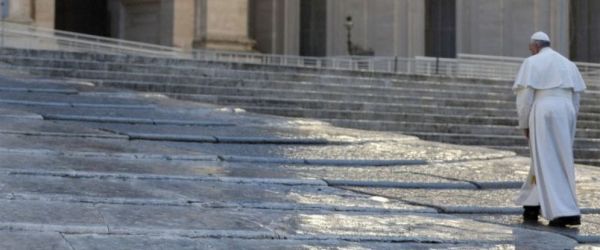In this Sunday’s Gospel (Mt 5:38-48) — one of the passages that best illustrates Christian “revolution” — Jesus shows us the way of true justice through the law of love which is greater than the law of retaliation, “an eye for an eye and a tooth for a tooth”. This ancient law imposed the infliction on wrongdoers of a punishment equivalent to the damage they caused: death for those who killed, amputation for those who injured, and so on. Jesus does not ask his disciples to abide evil, but asks them to react; however, not with another evil action, but with good. This is the only way to break the chain of evil: one evil leads to another which leads to another evil.... This chain of evil is broken and things truly begin to change. Evil is, in fact, a “void”, a void of good. It is not possible to fill a void, except with “fullness”, that is, good. Revenge never leads to conflict resolution. “You did this to me, I will do it back to you”: this never resolves conflict, nor is it even Christian.
According to Jesus, the rejection of violence can also involve the sacrifice of a legitimate right. He gives a few examples of this: turn the other cheek, give up your coat or money, accept other sacrifices (v. 39-42). But such sacrifice does not mean that the demands of justice should be ignored or contradicted. No, on the contrary, Christian love, which manifests itself in a special way in mercy, is an achievement superior to justice. What Jesus wants to teach us is the clear distinction that we must make between justice and revenge. Distinguishing between justice and revenge. Revenge is never just. We are permitted to ask for justice. It is our duty to exercise justice. We are, however, not permitted to avenge ourselves or, in any way foment revenge, as it is an expression of hatred and violence.
Jesus does not wish to propose a new system of civil law, but rather the commandment to love thy neighbour, which also includes loving enemies: “Love your enemies and pray for those who persecute you”. (v. 44) And this is not easy. These words should not be seen as an approval of evil carried out by an enemy, but as an invitation to a loftier perspective, a magnanimous perspective, similar to that of the Heavenly Father, who, Jesus says, “makes his sun rise on the evil and on the good, and sends rain on the just and on the unjust”. (v. 45). An enemy, in fact, is also a human being, created as such in God’s image, despite the fact that in the present, that image may be tarnished by shameful behaviour.
When we speak of “enemies”, we should not think about people who are different or far removed from us; let us also talk about ourselves, as we may come into conflict with our neighbour, at times with our relatives. How many hostilities exist within families — how many! Let us think about this. Enemies are also those who speak ill of us, who defame us and do us harm. It is not easy to digest this. We are called to respond to each of them with good, which also has strategies inspired by love.
May the Virgin Mary help us follow Jesus on this demanding path, which truly exalts human dignity and lets us live as children of our Father who art in Heaven. May she help us exercise patience, dialogue, forgiveness, and to be artisans of communion, artisans of fraternity in our daily life, and above all in our families.
[Pope Francis, Angelus 19 February 2017]












